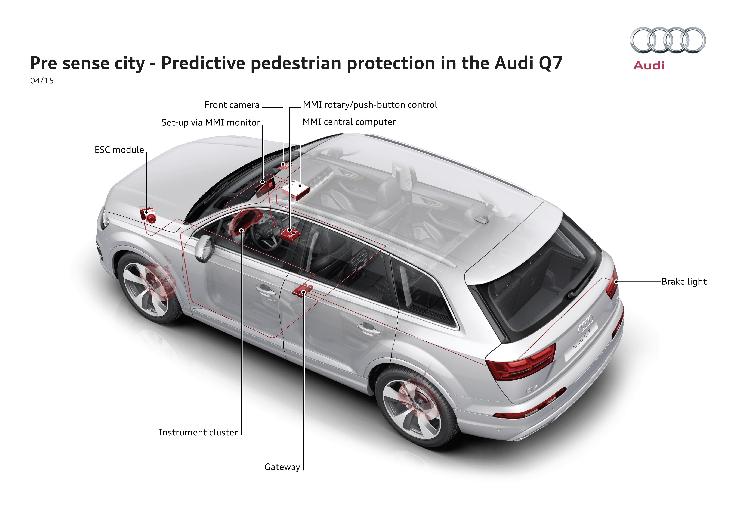
Five stars for Audi Q7 in Euro NCAP crash test
The European Euro NCAP consortium has awarded the new Audi Q7 with the top grade of five stars for safety. The results for adult protection in frontal and side impact collisions, pedestrian protection and child safety put the current Audi Q7 among the safest cars in its category.
The testers give the new Audi Q7 the top grade of five stars for safety. The results for the rear passengers in a frontal impact collision show that not just the driver and front passenger in the Audi Q7 are very well protected, the rear passengers are, too. The car also offers plenty of room and a high level of safety of children. Up to six child seats can be installed in the SUV. The generous spaciousness makes their installation simple and comfortable. The individual seats in the third row are fully usable and are also certified for ECE Group III child seats for children weighing up to 36 kilograms.
The model received the “Euro NCAP Advanced” reward for the multicollision brake assist system and for Audi pre sense basic, which in danger situations tensions the seatbelt before a collision and closes the windows and sunroof. The multicollision brake assist system initiates braking automatically in case of an accident to reduce the risk of skidding and the danger of further collisions. Both systems are standard in the Q7.
Audi also places maximum value on integral safety, going above and beyond the measures assessed by the institution. A central element in the Audi Q7 is the standard Audi pre sense city, a predictive warning and emergency braking system for accident avoidance and the protection of pedestrians. At speeds up to 85 km/h, the system observes the road with respect to other road users. On threat of a collision, it warns the driver according to a graduated concept: warning, warning jolt and automatic emergency braking.
If necessary, it initiates full deceleration. Up to 40 km/h accidents can be avoided completely within the system limits. At higher speeds (up to 85 km/h) the driver is warned. In addition, Audi pre sense city uses brake intervention to reduce the impact velocity and thus mitigate the consequences of the accident.
Other new assistance systems that make the Audi Q7 even safer in traffic are the collision avoidance assist, turn assist and exit warning. Whereas the collision avoidance assist helps the driver to drive around an obstacle to avoid an accident, the turn assist monitors oncoming traffic when turning left at low speed. In a dangerous situation, it brakes the Q7 to a complete stop, if necessary, to prevent a turn if there is oncoming traffic. With the exit warning, LEDs light up red to warn occupants when the doors are opened if other vehicles or bicycles are approaching from the rear.
Established in 1997, the New Car Assessment Program (NCAP) investigates the crash performance of new car models. In 2015 the consortium made the requirements for the front and side impact collision tests even tougher in order to reflect actual accident scenarios even more accurately.

























